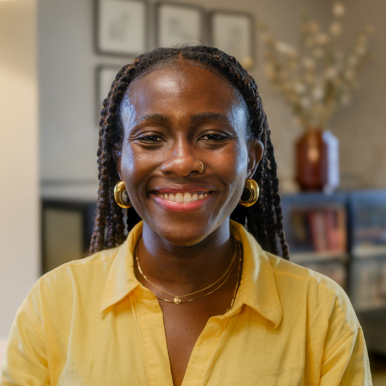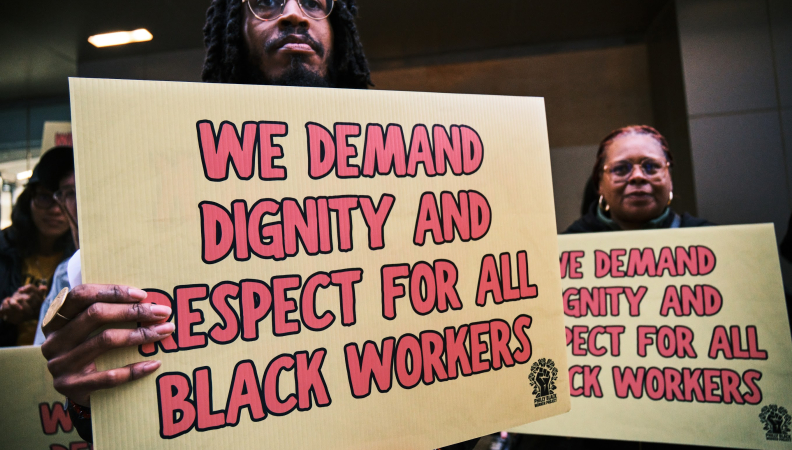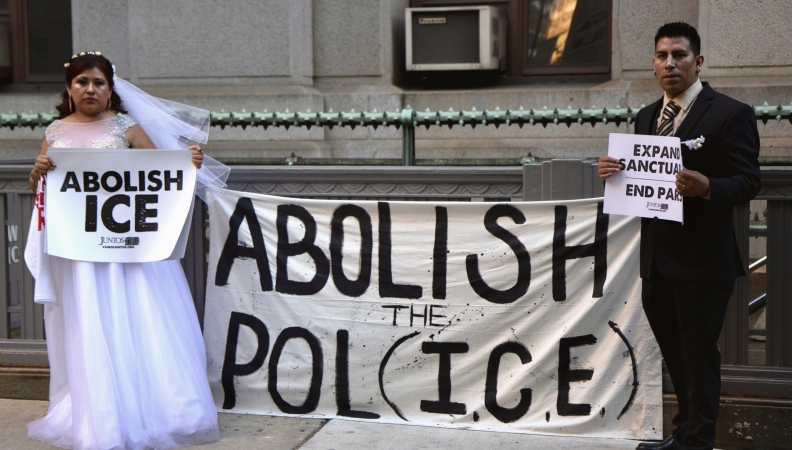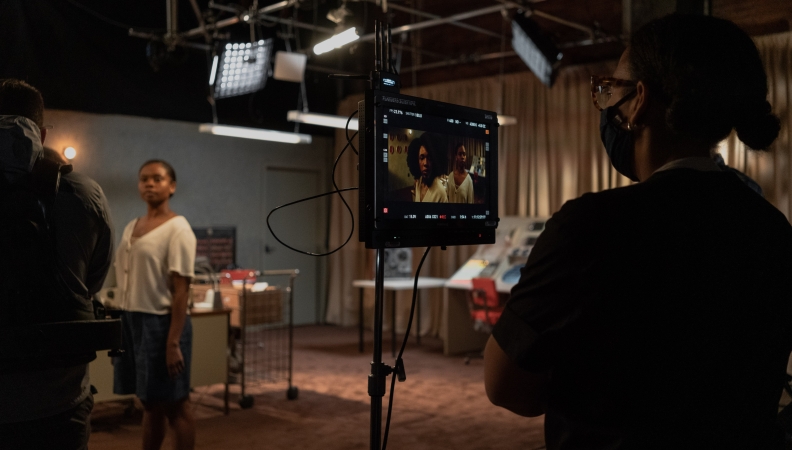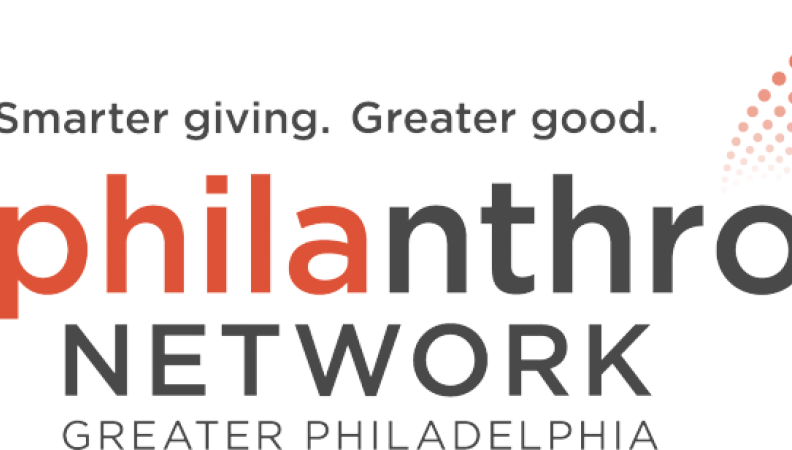More Than a Name: Becoming People's Media Fund
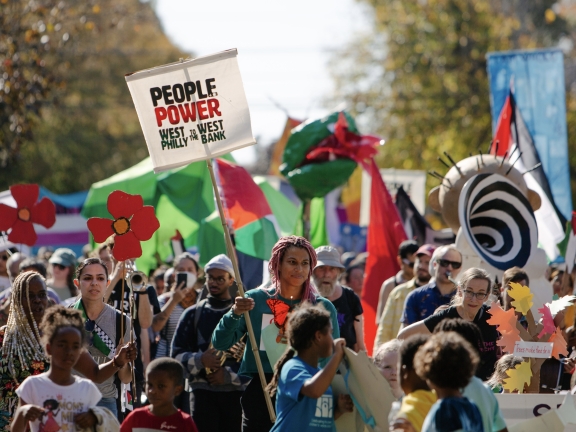
Independent Media Fund. IMPF. Independence Fund.
We know the name Independence Public Media Foundation has always been a mouthful. People get it wrong all the time. Even when we shorten it to IPMF, people still say IMPF or IMF. We laugh about all the iterations of the foundation’s name we’ve seen, including the time two staff members attended the same event, and their name tags listed the organization two different ways.
The name comes from our former life as a television station, WYBE Channel 35, whose legal business name was Independence Public Media of Philadelphia, Inc., and it made sense because WYBE was an independent public media outlet. We kept the legal name when WYBE closed its doors and became a private philanthropic foundation. Then, we added “Foundation” to become “Independence Public Media Foundation.”
The rebranding process to become People's Media Fund (PMF) began in January 2021. The board and staff felt that Independence Public Media Foundation didn’t reflect our emerging identity. As we began exploring a new brand identity, it also raised questions for us about the language we were using to describe our work to the public. That moment was a catalyst for strengthening aspects of our operations, governance, and grantmaking. We also took the time to engage deeply with the communities we support and the partnerships we’ve built, ensuring our prospective branding aligned with our core purpose.
Choosing our new name and brand was a deliberate process. We aim for both to reflect not who we assumed ourselves to be, but who our community recognized us as, holding us accountable to our mission, vision, and values: courage, joy, belonging, justice, and equity. For that reason, the name People's Media Fund resonated with both the board and the staff, making it a fitting choice.
In this conversation with PMF’s President, Molly de Aguiar, and Board Chair, Jamila Medley, we explore and reflect on our journey to becoming the People’s Media Fund.
Enni Aigbomian: Now that we are on the other side of the rebrand, can you reflect on how solidifying our identity through our grantmaking, operations, and board/staff relationships contributed to the name change and rebranding process? How do you think things would have turned out differently if we had started with the rebrand before completing these other steps?
Jamila Medley: 2021 was a year of introducing new ideas—such as bringing a racial equity lens to impact investment—while figuring out how to adjust to challenges brought on by trying to establish a solid relationship between tenured and new board members, including myself, during a pandemic. While staff were ready to fully engage with the rebranding process, including a potential name change, the board was grappling to understand and consider an approach to define the organization’s identity and goals. Asking the staff to slow down the rebranding process was essential to allowing the board to figure out some things for itself so that it could move alongside the staff with a more unified voice.
In fact, in 2021, a critical discussion between the board and staff regarding the rebranding effort truly energized the internal work of the foundation over the next few years. We recognized the shared direction that both the board and staff wanted to pursue, and we began a journey to update PMF’s values, vision, and mission, while also refining our core strategies and goals. If we hadn’t taken the time to slow down the process, I believe we might not have found the motivation and determination to clarify these essential aspects of the People’s Media Fund’s identity.
Molly de Aguiar: I don’t know how often it happens that a decades-old organization with a legacy and community relationships completely transforms itself into a very different kind of organization. We were a television station that became a private foundation to carry forward a commitment to community media, but in a totally new way. That raises a lot of questions about identity!
As Jamila points out, it took us some trial and error to figure out how to honor the history and accomplishments of WYBE while forging a new path and identity for the foundation. Moreover, we were a mix of people with long ties to the television station and no ties to the station at all, so early on, we weren’t on the same page about how to marry the station’s past with the foundation’s present work and aspirations for our future.
The rebranding conversations in 2021 compelled us to go back to basics by examining our values and asking whether our stated values reflected the foundation’s work and identity. We agreed they did not. As Jamila noted, that’s when we undertook the journey to update our values, vision, mission, goals, and strategies. It wasn’t a total reimagining—it was a refinement. And, importantly, it was an opportunity for the board and staff to work together to gain clarity about our identity and aspirations.

Enni: I'm glad you both pointed out how transparency and collaboration between the board and staff were essential as we worked to ensure alignment, even during setbacks. How did you both steward board and staff through various decision-making processes, such as choosing to undertake the name change, selecting a new name, color palette, etc.?
Jamila: There were many people involved in helping us along this journey. In particular, when I noticed places where we seemed to get stuck, I leaned on my experience supporting nonprofits and cooperatives striving to create democratic management and governance systems to engage PMF’s board and staff in participatory and inclusive decision-making processes. For example, I introduced the fist-to-five approach to test for alignment and agreement after discussion of a topic.
This tool allows us to see how close we are to consensus and if we still need rigorous discussion or amendments to proposals to arrive at a decision. The People's Media Fund values consensus, and while many votes pass based on majority approval, we aim to hear people out. And, when we get stuck, we’ve borrowed from sociocratic governance practices to strive for consent.
Molly: We relied on a mix of professional help and bringing our own experience and skills to the table. Leticia Peguero and Amanda Perez Leder facilitated conversations about identity and values early on, and Wilfredo Hernandez engaged our grantee partners in conversations about updating our mission, vision, and program strategies. Jamila’s facilitation skills and practice with different decision-making techniques helped us have better conversations and make decisions more quickly.
I also want to lift up board members Omar Woodard and Sidney Hargro and their extensive governance knowledge, which helped us frame conversations and hone in on the right questions to consider. My role sits in between board and staff, so I have to bring high-level strategic thinking about how we move together—trying to balance and reconcile board and staff needs, ideas, and concerns—while also ensuring a well-organized and inclusive process.
Enni: As part of our process, we also sought input from our community—including grantees, funding partners, staff, and board members—on our previous name (IPMF), potential new names, colors, and even what to avoid. What was your favorite part of the rebranding and naming process? Did you have any interesting takeaways from the community feedback we received?
Molly: Any time you seek input from the community, you hope that what will be reflected back is that you have done a pretty good job of living your values and upholding your commitments, such that the community’s input is “we like it!” So my favorite part of the process was getting affirmation from our partners that we could credibly call ourselves the People’s Media Fund. We know that the name is aspirational and that we have to keep living up to it. I also love, even though it’s dumb luck and not by design, that our initials are changing from IPMF to PMF. Most people know us as IPMF, rather than “Independence Public Media Foundation,” so it should make the change to PMF easier for people to remember.
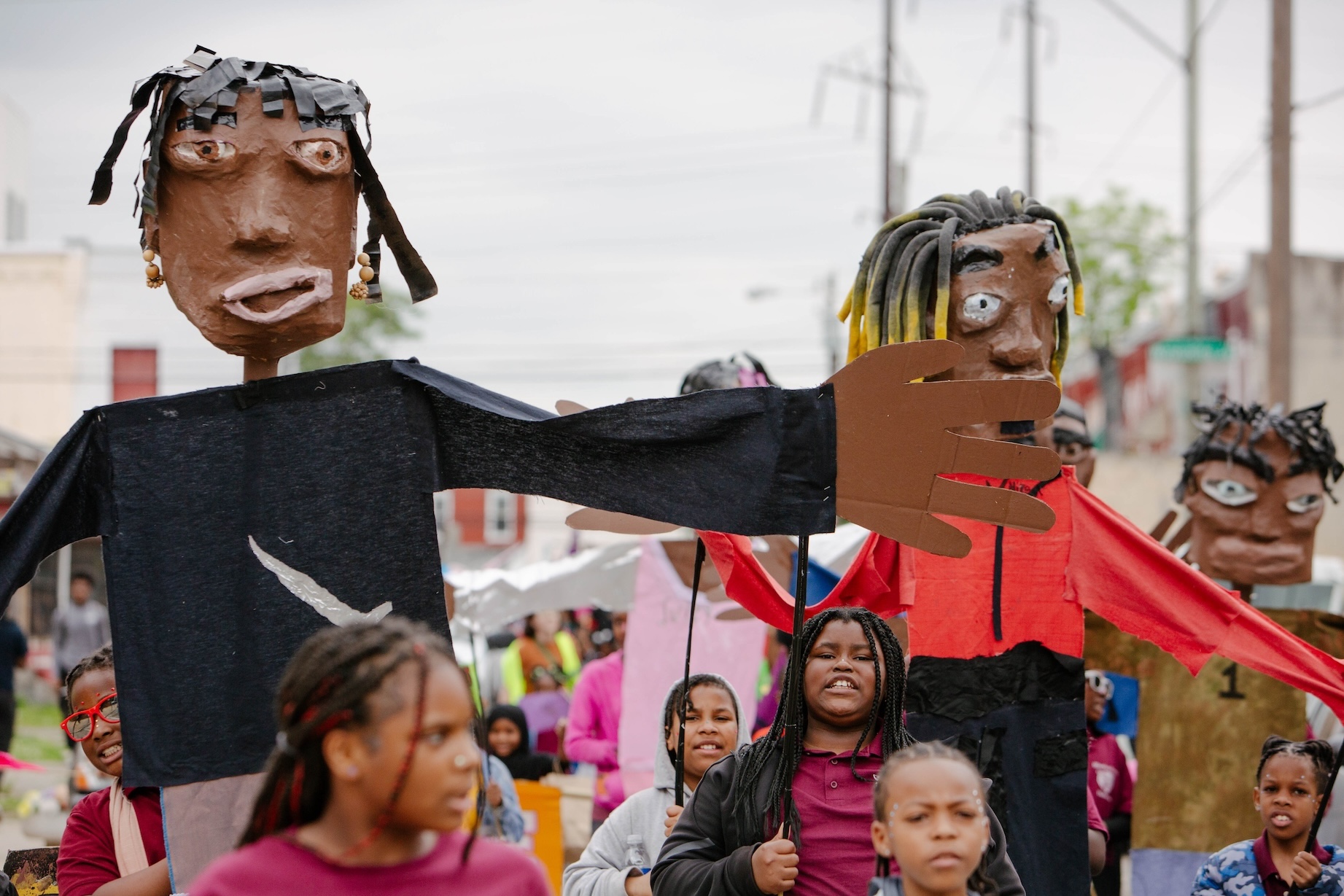
Enni: We aimed to be intentional about each aspect of the brand style, including the color palette and logo. Can you both share your thoughts on these choices and what they symbolically represent regarding PMF's work, values, and the communities we support?
Jamila: As we went through the process, I definitely had moments when I thought PMF would benefit from having a logo and color scheme that leaned more stoic, understated, and clear. My imagination was limited, perhaps because so much of our work is serious, we live in dangerous times when many are doing everything they can to not call attention to themselves or their efforts.
Yet, the board and staff continued the dialogue about this, and as we referenced our values (particularly courage and joy), I swayed. I began to get excited and to feel more hopeful. I shared with others a desire for PMF’s brand to be accessible, aspirational, and demonstrable of possibilities. I wanted more and more for the colors and logo to articulate belonging for us all.
So the crisp hues, swirls, thick font, and symbols are very appealing to me. They articulate that we are here for the curiosity, the exploration, the celebration, the potential, as well as the tried and true, the strength building, and the daring. I think this expresses a range of experiences and stories that our community represents and shares. I hope we can all find ourselves in this brand.
Molly: I want to emphasize Jamila’s point about living in dangerous times and the question that raises about how much to call attention to yourself, which I think is a legitimate concern, and I wouldn’t begrudge anyone for weighing that in their decision-making. At the same time, I firmly believe that philanthropy is tragically averse to using its considerable power to take principled stands.
So I love that the board and staff voted for a bold new name, logo, and colors, and I appreciate that it took some courage to make that decision right now. When coupled with the work we do, what I hope this new name and look convey is our willingness to take a stand for justice and equity, and our commitment to solidarity and people power.
Enni: Our shared hope is that this name holds us accountable to being a foundation “for the people,” as Jamila says. In what ways do you envision the name People’s Media Fund reminding us to live out our values daily, while remaining committed to equity, accountability, and partnership? How can we continue honoring WYBE’s history of community-centered media and foster dialogue among people from different backgrounds?
Jamila: I did not know about WYBE until I joined PMF’s board of directors in 2021. I learned that WYBE provided the opportunity for the universal and diverse ways in which people—working people, children, elders, dreamers, and fact sharers—live, struggle, and love to be visualized and heard. We honor that legacy by accepting that this new name, People’s Media Fund, is a declaration.
I hope that this name reminds those of us who steward the Fund to practice amongst ourselves and with our partners a commitment to openness, vulnerability, and confidence as we cooperate to build a stronger, more connected, and more accessible community-centered media infrastructure and ecosystem in our region. The results of our efforts do matter. How we get there, how we treat one another, and what kind of relationality we allow to thrive are also essential.
So, our values cannot be taken for granted because the name says a lot. I think PMF will inspire us to be even more principled in how we show up together, how we distribute the social and collective power that comes with the Fund, as well as its financial resources.
Molly: We are already practicing asking ourselves, “If we are the People’s Media Fund, what does that mean for [x, y, or z decision]?” I believe the more we interrogate what it means to live up to the name, the more it’s going to push us potentially into uncomfortable but also exciting territory. Philanthropy has a lot of control issues; we bring our personal relationship with and baggage about money into our roles and our decisions, and it’s a constant battle to admit that and grapple with it. But it energizes me to imagine where it might lead us if we can transform our relationship to money and unlearn our need for control.
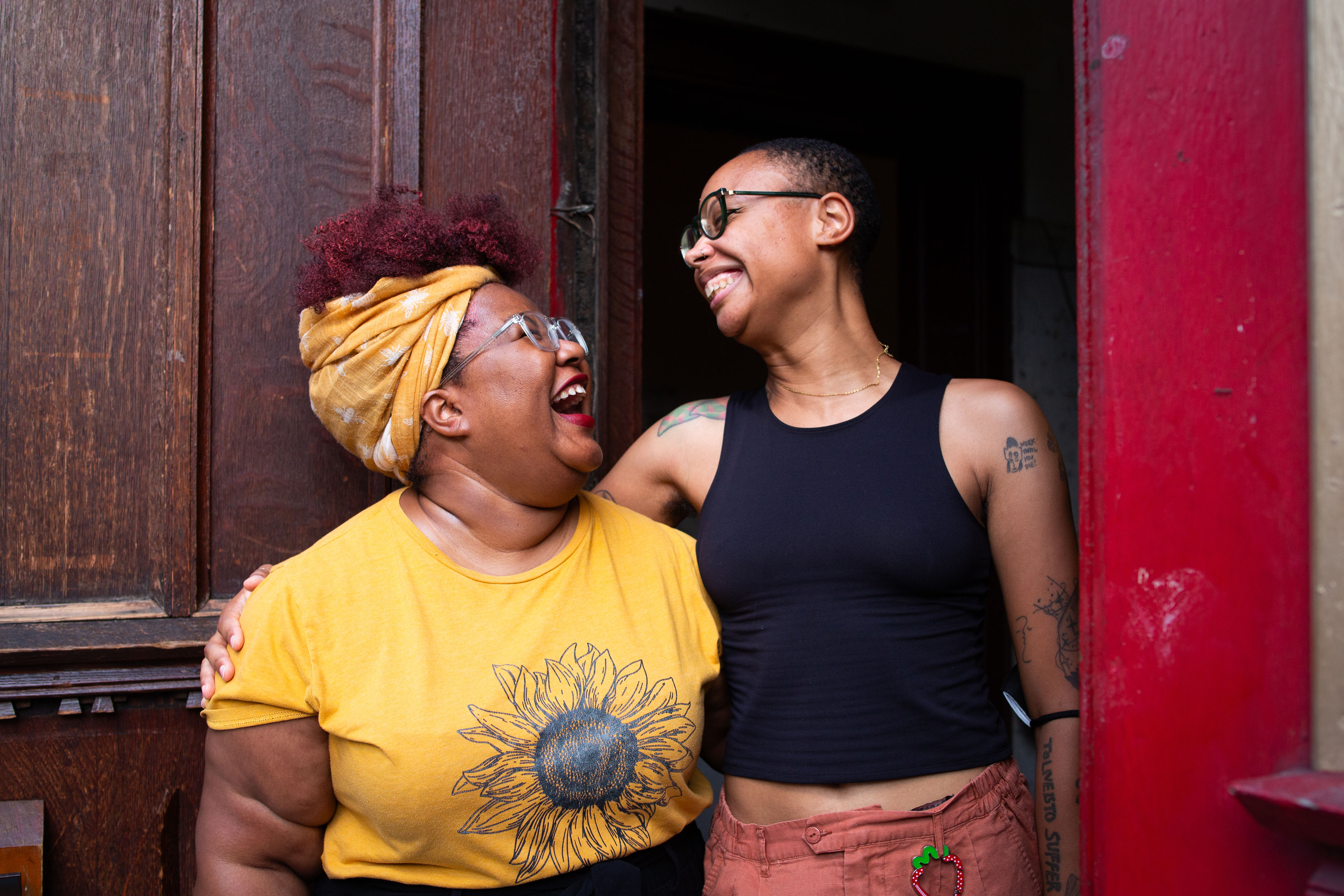
Enni: What does being the People’s Media Fund mean to you? How do you hope this new name will help hold us accountable to our commitments to racial equity, trust-based philanthropy, and community-led grantmaking?
Jamila: To me, the People’s Media Fund means that we are aspiring to and actively engaging to be a resource that prioritizes the needs, interests, and perspectives of those people and communities whose stories and experiences are too often left untold and unheard. In my opinion, that looks like greater opportunities for intentional shared stewardship of the Fund through sustaining and expanding participatory grantmaking opportunities, as well as greater grantee representation in the Fund’s leadership. For me personally, a longer-term vision for this kind of people-led movement building for community media resource generation and mobilization is essential to living up to this name.
Molly: As an organization, our moral center is a commitment to community self-determination. So the People’s Media Fund supports the conditions for community self-determination by sharing a broad array of resources—money, time, connections, etc.—and by specifically prioritizing communities whose stories are overlooked and deliberately suppressed and whose calls for justice and equity are the most likely to be ignored. Collectively, we have to change who holds power in media and digital access to contest and shift harmful narratives that prevent community self-determination.
I really value that the name is a built-in mechanism for holding ourselves accountable, and also that it’s an invitation for others to hold us accountable.
Enni: Feedback on rebrands and name changes can often be unpredictable. You put in the work and then hope for a positive response when everything is unveiled. What advice would you give to other funders who are planning to undertake this process? How can they present a new brand or name in a way that does not overpromise or underdeliver, and that accurately reflects how the communities they support perceive them?
Jamila: Trust the staff and lean into what you hear from them. PMF’s staff is well-connected to our grantee community, much more so than our board has been historically. As they work day to day with grantees, funders, and other partners, we rely on them and the research from the consultants who supported the rebranding process to steward our shared meaning-making. Having high trust, however, does not imply automatic agreement. In one case, when Message Agency brought an image to the board to help us connect with a theme, a board member shared that the image also had a very different meaning that was not a positive association. Hearing different perspectives while trusting intent is a dynamic exercise in inclusive and highly participatory decision-making efforts.
Additionally, we attempted time and again to reference PMF’s values. As such, I believe that most board and staff members were willing to be bold, a bit more audacious when thinking about the brand and name. We identified strongly with all of our values. In our rebranding effort, however, we are really demonstrating our courage and joy!
Molly: Enni, when you say “you put in the work and then hope for a positive response,” what “put in the work” means to me is committing to being the organization you say you are and want to be, and having the humility to acknowledge and learn from mistakes you will invariably make along the way. People have a very finely-tuned radar for phonies. I have found that being transparent in a field famous for being opaque goes a long way toward building trust with the community. And in return, communities will offer you grace if you overpromise or underdeliver.
For funders considering undertaking this process, my advice would be to seriously and honestly interrogate whether you have credibility and trust with the communities you aim to serve. If the answer is no, then forget about rebranding and spend your time and energy putting in that work.
Photo Credits: Rachael Warriner for Spiral Q, Janae Kindt and Tshay Williams for People's Media Fund
